Michael Laub / Remote Control Productions
Return Of Sensation (1984)
PHOTOGRAPHY / CREDITS / PRESS
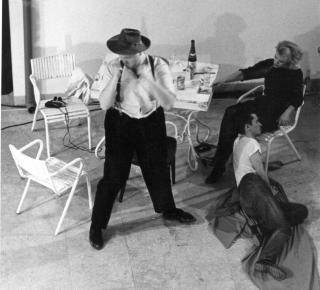
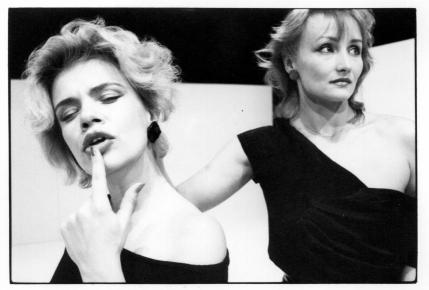
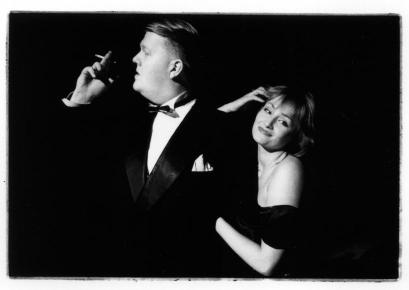
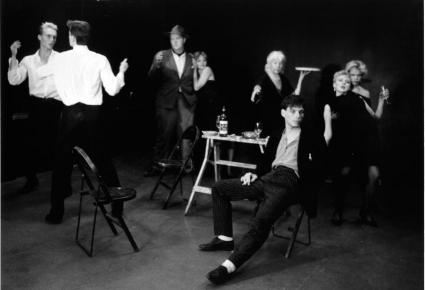
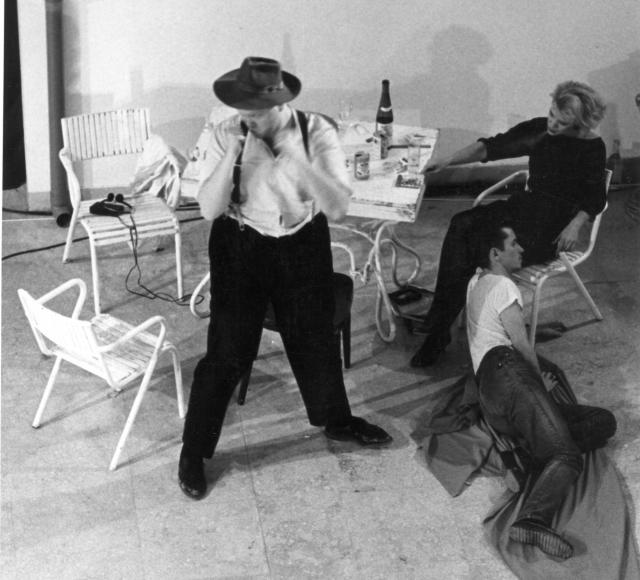
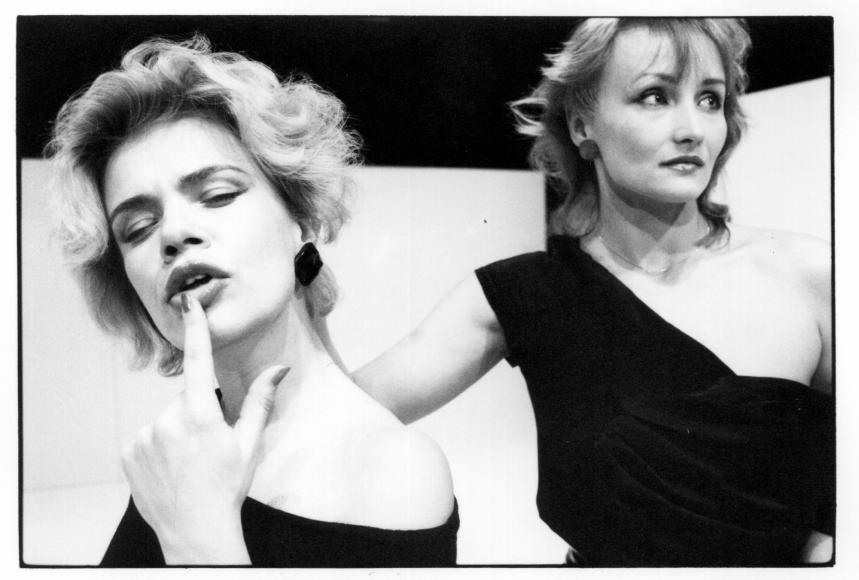
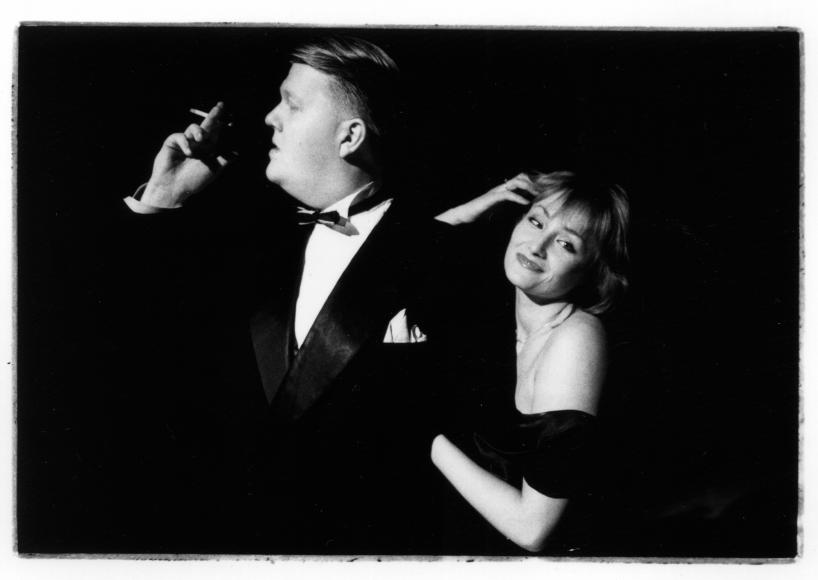
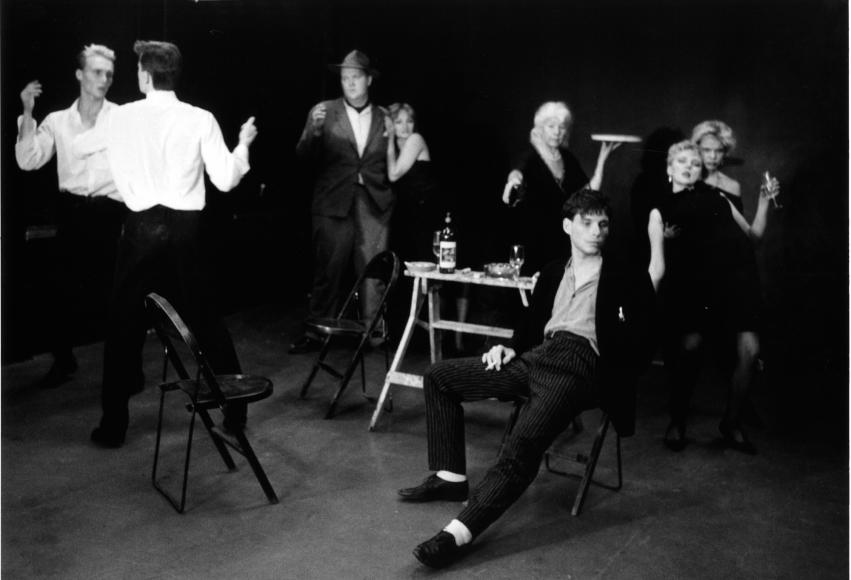
CREDITS
Directed by Michael Laub
Performers Jarmo Huusko, Saija Hyvonen, Harry Landen, Lili Maas, Margareta Petterson,UrbanReese, LarsToth, GunÖhman
Lighting Anders Österberg
Music Juan Dern
Additional material Patrick Selinger
Produced by Michael Laub
Urban Reese
‘A Bientot’
Mr. Mondo
Film Christine Koenigs
Executive producer Mr. Mondo
Text Michael Laub, Juan Dern, Mr. Mondo
Assistant director and additional material
Juan Dern
Commissioned by XXXII Theatre Festival of Theatre, Venice Biennale, 1984
PRESS
Gianni Manzella and Gianfranco Capitta, Il Manifesto, Rome, 23.10.1984
In white shirts and discreetly elegant costumes, three couples surrender to slow movements, with gestures and poses suggestive of glamour. But this patina of illusion, enriched with cinematic references and floating in a sea of cocktails and cigarettes, is broken by two other presences: an old woman and a fat young man who is by himself capable of filling the image. She stays on the sidelines of the stage; he imposes his overbearing physical strength. He needs only a wide-brimmed hat to create a character. The fragmented structure with its variations and repetitions creates a progressive, internal disorder as the only measure of time. The process is still analytical, reinforced by multimedia elements of film and video, but the impact is emotional.(...) The theatre of the 1980s begins here.
Giorgio Sebastiano Brizio, Avanti, Rome, 23.10.1984
Laub uses quotations outside their context (material from thrillers and soap operas), separating meaning from content through repetition of the actions, the musical score, the erotic and mundane rituals. Two characters act as syntax and grammar: they narrate the tautological plot (...). The actors, essentially free, control their reactions to text through images and actions of connection and recollection, opposition and nonsense, taking on different roles each time: violent or repressed, sensual or erotic, thus obeying theoretical rules of behavioural didactics.
Ugo Volli, La Republica, Rome, 23.10.1984
(...) always violent, always with a hard look, the six actors give life to a series of actions and relationship, repeating them many times with small variations. (...) This work is not about a story or looking for coherence, it’s about creating an atmosphere.
Bim Clinell, Dagens Nyheter, 30.11.1984
Return of Sensation radiates a destructive force that is fascinating.
Ekstra Bladet, Kopenhagen, Poul Borum, 10.06.1985
There are four women and four men who are dressed and move exactly as if they were heading from the cappuccino road in the direction of death road. (...) This exceptionally exciting performance in Saltlageret is a string of tableaux from a café, video, neon and attitude world, where young people say: God, I’m bored, let’s be bored together. The eight theatrical dolls perform aggressively and authentically. This is a world which exists, and they substantiate this in its own language, accompanied by roaring, well-nigh absorbing electronic music. During the 1¼ hour performance, one experiences the individuals more and more. But they are firstly and most importantly figures in a room where there are continuously incidental choices between ‘this’ and ‘something else’ – distinctly postmodern, in other words. Remote Control is probably one of the most extremely, almost arrogantly different performances we will see this year. (...)
Jens Kistrup, Berlinske, Kopenhagen, 11.06.1985
(...) Remote Control’s multimedia show Return Of Sensation is a beautiful study of a life on the border of not being life any longer. To the accompaniment of hectic, neurotic (...) sound in a large white room, the characters move like fish in an aquarium. A ritualizing, a lack of contact, a stagnation or paralysis, which makes their life empty, sad, barren and occasionally brutal, especially when the ritual works as if these people have accepted their fate, as if life ‘is’ the way their life is. It can well be that Return Of Sensation is a kind of protest against, or at least a link with, their own universe, but it is beforehand a certain moving pattern, theme, with an infinity of small variations – this is at times the eminent strength of Remote Control’s theatre. Everyone performs their ritual exercise (...) and within these limits is found a vitality and variation of dramatically human experimentation that is undeniably large. (...) It is an art form which derives from yesterday its postmodern limits that today’s, tomorrow’s world could use as aesthetic destruction.
Inga-Lill Valfridsson, Aftonbladet, Stockholm, 30.11.1984
The performance is very strong, beautiful and suggestive, with traits of 1950s cinema and bad detective stories.